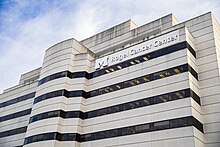University of Michigan Rogel Cancer Center
This article contains promotional content. (November 2023) |
The University of Michigan Rogel Cancer Center is a cancer research and treatment institution based in Ann Arbor, Michigan, United States. The Rogel Cancer Center is affiliated with the University of Michigan and Michigan Medicine.

History
editThe Rogel Cancer Center was founded in 1986 at the University of Michigan. In 1988, it was designated as part of the National Cancer Institute cancer centers program. It received comprehensive cancer center status in 1991 and continues to be an NCI-designated comprehensive cancer center today.[1]
From 1991-2018, it was known as the University of Michigan Comprehensive Cancer Center. The center was renamed the Rogel Cancer Center in 2018 in recognition of a $150 million commitment from Richard and Susan Rogel.[2]
The Rogel Cancer Center is ranked among the top cancer programs by U.S. News & World Report.[3] In addition to being an NCI-designated comprehensive cancer center, it is a founding member of the National Comprehensive Cancer Network[4]
The center’s founding director was Max Wicha, a medical oncologist and researcher who was part of the team to first discover cancer stem cells in a solid tumor.[5] Wicha served as director for 27 years. He was succeeded by Theodore Lawrence in 2015 and by Eric Fearon in 2016. Fearon is a nationally recognized investigator in cancer genetics whose research has led to a greater understanding of the gene defects that cause colon and rectal cancer to develop and spread.[6]
Scientific programs
editResearch at the Rogel Cancer Center is divided into six basic, clinical and population science programs:[7]
- Signaling and Tumor Microenvironment
- Cancer Genetics
- Cancer Hematopoiesis and Immunology
- Developmental Therapeutics
- Translational and Clinical Research
- Cancer Control and Population Sciences
Accomplishments
editNotable cancer research discoveries from the Rogel Cancer Center include:
- Identifying the TMPSS2:ERG gene fusion, which is seen in 50% of all prostate cancers[8]
- Developing new potential treatments for graft-versus-host disease[9]
- Creating new mouse models to facilitate research in cancer biology[10]
- Identifying cancer stem cells in numerous solid tumors and elucidating how these small number of cells within a tumor are what fuels its growth and spread[5]
- Assessing the long-term financial issues that cancer treatment causes for many patients[11]
- Developing new ways of giving radiation therapy to improve the efficacy while reducing impact on normal tissue[12]
References
edit- ^ "NCI-Designated Cancer Centers". National Cancer Institute. 2012-04-05. Retrieved 2019-09-19.
- ^ admin (2013-09-12). "Timeline". Rogel Cancer Center | University of Michigan. Retrieved 2019-08-14.
- ^ "Best Hospitals for Cancer". U.S. News & World Report.
- ^ "About NCCN". www.nccn.org. Retrieved 2019-08-14.
- ^ a b Al-Hajj, Muhammad; Wicha, Max S.; Benito-Hernandez, Adalberto; Morrison, Sean J.; Clarke, Michael F. (2003-04-01). "Prospective identification of tumorigenic breast cancer cells". Proceedings of the National Academy of Sciences of the United States of America. 100 (7): 3983–3988. doi:10.1073/pnas.0530291100. ISSN 0027-8424. PMC 153034. PMID 12629218.
- ^ Fearon, Eric R.; Vogelstein, Bert (1990-06-01). "A genetic model for colorectal tumorigenesis". Cell. 61 (5): 759–767. doi:10.1016/0092-8674(90)90186-I. ISSN 0092-8674. PMID 2188735. S2CID 22975880.
- ^ Anonymous (2013-08-08). "Research Programs". Rogel Cancer Center | University of Michigan. Retrieved 2019-08-14.
- ^ Tomlins, Scott A; Laxman, Bharathi; Varambally, Sooryanarayana; Cao, Xuhong; Yu, Jindan; Helgeson, Beth E; Cao, Qi; Prensner, John R; Rubin, Mark A (February 2008). "Role of the TMPRSS2-ERG Gene Fusion in Prostate Cancer". Neoplasia (New York, N.Y.). 10 (2): 177–188. doi:10.1593/neo.07822. ISSN 1522-8002. PMC 2244693. PMID 18283340.
- ^ Reddy, Pavan; Koreth, John; Dinarello, Charles A.; Lewis, Eli C.; Choi, Sung Won; Yanik, Gregory A.; Parkin, Brian L.; Alyea, Edwin P.; Ho, Vincent T. (2018-01-01). "α1-Antitrypsin Infusion for treatment of Steroid Resistant Acute Graft-versus-Host Disease". Blood. 131 (12): blood–2017–11-815746. doi:10.1182/blood-2017-11-815746. ISSN 0006-4971. PMC 5865235. PMID 29437593.
- ^ "Building a Better Mouse Model for High-Grade Serous Carcinoma". Cancer Network. September 13, 2018.
- ^ Reshma Jagsi; Pottow, John A.E.; Griffith, Kent A.; Bradley, Cathy; Hamilton, Ann S.; Graff, John; Katz, Steven J.; Hawley, Sarah T. (2014-04-20). "Long-Term Financial Burden of Breast Cancer: Experiences of a Diverse Cohort of Survivors Identified Through Population-Based Registries". Journal of Clinical Oncology. 32 (12): 1269–1276. doi:10.1200/JCO.2013.53.0956. ISSN 0732-183X. PMC 3986387. PMID 24663041.
- ^ You, D.; Aryal, M.; Samuels, S. E.; Eisbruch, A.; Cao, Y. (December 2016). "Temporal Feature Extraction from DCE-MRI to Identify Poorly Perfused Subvolumes of Tumors Related to Outcomes of Radiation Therapy in Head and Neck Cancer". Tomography. 2 (4): 341–352. doi:10.18383/j.tom.2016.00199. ISSN 2379-1381. PMC 5243121. PMID 28111634.